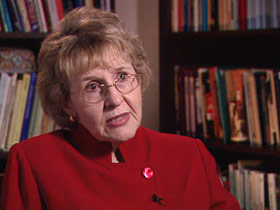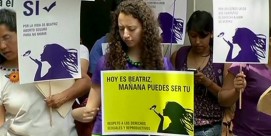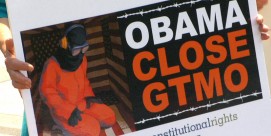In This Episode << SLIDE LEFT TO SEE ADDITIONAL SEGMENTS
Jean Bethke Elshtain Extended Interview
Read more of Kim Lawton’s interview about Iraq and just war with Professor Jean Bethke Elshtain, the Laura Spelman Rockefeller Professor of Social and Political Ethics at the University of Chicago Divinity School:
Q: Was the U.S. morally justified in going into Iraq?

A: I think the United States was morally justified in going into Iraq, given the information available to us at the time — not just the intelligence, which was shared by all the Western intelligence agencies, that Saddam did in fact have weapons of mass destruction (WMDs), so that was the best evidence. I don’t think we know what happened to those weapons. I suspect they were quickly shipped across the border into Syria because he knew that something was going to happen. But whatever happened to those weapons, certainly there was a preponderance of evidence that there was a problem there, which is why, I think, under President Clinton in 1998, the Iraq Liberation Act had been passed by the U.S. Senate, with the support of the administration, given the concern about WMDs in Iraq. So you had that piece.
Another piece that I think is very, very important and that didn’t get stressed as I would have liked it to have been, actually, was the question of what we loosely call humanitarian intervention. In the classic just war teaching, it’s protecting the innocent from certain harm. The data on what was going on in Iraq was horrid and overwhelming, about the numbers of lives lost in the years of Baathist rule and on an ongoing basis. That is, it wasn’t just stuff that happened in the past, but there were continuing horrors: the children’s prisons, the number of Iraqi children by UN figures lost because of Saddam’s gaming of the food and medicine for oil program, and so forth. Estimates ran to 60,000 kids a year. So the damage was ongoing, so I think that added to the moral justification.
Certainly, you had “right authority” — the United States government authorization by the Senate resolutions — and you had the best intention, so that you add up all those criteria, and I think it adds up to a moral justification.
Where the problem comes in, I think, and where a judgment call is always required, is on that one criterion that says “probability of success.” And there, it’s always going to be whether you’re going to have a more positive sort of look at what you think will eventuate, or you’re going to be more skeptical and more negative, and about how you think all the cards will unfold and so forth, how all the pieces will fit together. But you don’t know that in advance. That’s the challenge of the just war teaching; you don’t know that in advance.
We didn’t know in advance what was going to happen in Hitler’s Germany, obviously, when we got into that struggle, or against Japanese militarism. You just can’t predict. So if we go back to where we were before the war started, I would say, yes, at the time, it seems to me that we were morally justified. We can look back now and say perhaps we should have been more cautious, perhaps there was other intelligence we should have looked at about what would likely happen once the Baathist rule disintegrated and so forth. But those are all prudential judgment calls.
Q: Some people say the fact that weapons of mass destruction were never found negates the whole moral reason for going in.
A: I don’t believe that. War aims change over the course of fighting a war, for one thing. Take the American Civil War, for example. It started out clearly in Lincoln’s mind as a war to save the union. Period. Full stop. But then, as the war continued, it became in his own mind and in his own statements a war to end slavery. That’s a war goal that emerged over the fighting of the war when he began to see the costs and to see the phenomenon of slaves escaping from their owners in order to fight for their own freedom, and so forth. So the fact that you have a shift in the emphasis on war aims is nothing new.
Other war aims come to the fore. You could say in World War II the primary aim was to take out — in Europe — to take out Hitler, to end Nazism. But after the war, certainly, and even during the war, the aim became the democratic reconstruction of Germany, and that wasn’t stated by Roosevelt right at the outset. It was just, “Let’s stop this thing that is happening.” Then you get these other war aims that come in. So, for me, the fact that WMDs haven’t been found is not a trump card that obliterates all the other moral and ethical considerations that I think we need to keep in the mix as we talk about this.
Q: Looking at humanitarian aims, one has to acknowledge certainly that civilians are suffering because of the war. How do you make the proportionality argument, that analysis of whether this war has helped the innocent, which was one of its intentions?
A: This, too, is a difficult thing to sort out and to weigh in lives, which you can’t predict in advance of anything. Hundreds of thousands of civilians were lost in World War II, and yet people, certainly, think that was a just or justified war. I think there is one key moral distinction we have to keep in mind here, and that is whether or not civilians are being explicitly targeted. Are those the people we try to destroy? And the answer to that is no. Are civilians in harm’s way in certain situations? Absolutely. How do we get, in light of that, the best data on civilian casualties? And there have been some, I think, preposterously high figures being tossed around. I’m more inclined to believe the figure that I heard when I was in Casablanca, Morocco last November meeting with a group of Arab, Muslim scholars and leaders. They say around 25,000 [civilian casualties]. They were pretty firm on that, and, obviously, they have a reason to try to be as accurate as they can.
That’s a terrible cost. I mean, there’s no doubt about it, that’s a terrible cost. If you wanted to do something as unseemly as a body count and looked at the costs of Baathist rule, I think you could still say that there’s some proportional good, if the situation gets stabilized. You make that assessment if you still have the hope and if you are convinced that the outcome finally is going to be a minimally decent society where there is a rule of law and so forth. If that doesn’t happen, and if what the Iraqi people wind up with is conflict without end, then we can, looking back, say the costs were too high and this was a mistake. And if that happens, I think those of us who supported the war will have to acknowledge our error as well. Still, I think one has to take upon oneself the burden of the judgments one makes, and we’re not there yet.
Q: Can you see a time when you would look back and say it seemed right at the time but it wasn’t? When is the time to do that?
A: I can imagine if, let’s say, two years from now we’re still in a situation that is almost precisely analogous to the one we’re in now, and the Iraqis are still unable to deal with their own internal security environment, then I think I would say, well, this didn’t work out the way it was supposed to. And what one is obliged to do under those circumstances is to go back and reevaluate all the things that were taken in[to] account, not just the moral and ethical issues, which is what I concentrate on, but if you’re a policy maker, what did all the data tell you about the likely responses from all the religious communities internal to Iraq? What were the presuppositions people were working on about how folks who have strong differences would get along in a new kind of federated constitutional order? And so on. And to see where some of those assumptions were off track or were too optimistic. I think it would be an occasion for a review of all of that, because I daresay these kinds of situations are going to emerge in the future. I mean, we can never look at any historical period and see one that was conflict-free. So anticipating that something like this could happen again, you know, there are lessons that one has to learn.
I’m reasonably hopeful that we will still wind up with a good outcome, that is, a society in which men and women have equal civil rights, children are educated, not hauled off to prison for ostensible violations on the part of their parents, and an Iraq that could serve as an example for the Middle East more generally, of how people with these differences can learn to work together. It’s not entirely in the hands of the United States. The Iraqis themselves have to come to the fore.
Q: Do you find yourself still wrestling with the moral issues?
A: Oh yeah. Oh yeah. I mean, I think one of the strengths of the just war tradition is that you are obliged to wrestle with these moral issues. It’s not like having a tick list and you say, okay, tick, tick, tick, adds up to this, home free, and you just leave it behind. You have to ongoingly be in the process of making judgments and assessments. It’s not just a “that’s done and it’s over with” kind of thing. As I’ve said, the complexity of it is that much of how we evaluate what has happened over the long run turns on things we couldn’t have known when we started. I mean, that’s the way politics works. So I think some of those in the just war tradition who want a nice, clean situation, kind of a legal argument, you know, where it all adds up to this or it doesn’t, as the case may be — it’s not that neat. I mean, the just war tradition emerged historically as a way to try to instruct Christian statesmen about how to act in a fallen world. And a statesman, a stateswoman, is by definition someone who makes prudential judgments based on incomplete information, because you can never have perfect information. So it’s not surprising when things go awry. What one is obliged to do under those circumstances is to think about whether or not you could have done anything to prevent these bad things from happening, assuming that they have.
Q: Just war theory also talks about conduct during conflict. There are certain standards for behavior. Do you feel the U.S. has lived up to ethical standards in the conduct of war?
A: With few exceptions, I think so. Let’s look at three different cases. Think about the ordinary, everyday conduct of the average U.S. soldier, and I think you would find that they try very, very hard to stay within strict rules of engagement. Certainly that involves no intentional targeting of civilians. It may involve, in some situations, putting your own life at risk rather than create a situation where large numbers of civilians are harmed, and so on. I’m convinced that the vast majority of our military acts in accord with those kinds of requirements.
Then there are two other cases we need to look at in the Iraq situation. One is brutal, door to door, urban fighting of the sort we had in Fallujah. That is an almost impossible situation within the framework of the just war tradition. Some just war writers have written about this, acknowledged how difficult it is. Do you just assume the house is booby-trapped and try to throw in some grenades and try to take the thing out? Or do you take some real risks by going in there to make sure there is nobody in the house before you demolish it? I mean, how do you deal with this kind of situation? If you holler and say, “Is anybody in there?” you give away your position. You may endanger your own men. So these are judgments that have to be made, split-second judgments, and that’s a very difficult situation. I think it’s easy enough when you are sitting in the living room reading the newspaper to judge people rather harshly. But I think Fallujah is the one we should look at more closely in terms of our rules of engagement and just acknowledge how tough it is for our soldiers in that kind of fighting.
And then the third case, obviously, would be the Abu Ghraib — I don’t know what to call it — mentality, I think, on the part of those who were assigned that task, who clearly were not trained for it, clearly had no sense of the restraints on how you are supposed to deal with prisoners, were evidently just free to do what they were doing in that particular area of the prison without supervision. You had minimally a breakdown of the command and control situation, and then it doesn’t take much. You get one or two bad apples and, unfortunately, a whole lot of people are prepared to go along in it. It’s a terrible business, and I think that one needs to punish those who engage in that kind of activity and do so very decisively. Because that is simply not the way soldiers under just war norms of restraint are to behave, and it’s not the way you want the American soldier to be perceived in the eyes of the world. So, even though this has all been blown up, I think, to a grotesque degree by those who want to attack the United States and our credibility, it was a terrible business, and it should not, absolutely should not have happened. I’m glad the military took those people in hand, tried them, punished them. I guess the only question would be did they go high enough up in the chain of command as far as assessing responsibility.
Q: What does just war teaching say the moral and ethical principles are that should be taken into account for the situation we are in now in Iraq? Does just war thinking have something to say?
A: Well, it has very little to say. Historically, I think, the assumption was that war was going to be between two principalities or two powers, and one would defeat the other, and the resolution of the thing would be going back to the status quo ante, you know, we’ll go back to the borders that pertained before the war, and that’s the end of it. The one thing the just war tradition does say is, there’s not to be a punitive or vindictive peace, because you want to restore relations by the war itself. But it doesn’t say very much beyond that.
We’re in a situation now, as we have been at a number of other points in our history, where we are in fact an occupying power, and I think the question is, what is a just occupation? What does it mean to be in that situation and to have that degree of responsibility? Minimally, I think we need to first of all assess our degree of responsibility, and if ours was a major responsibility, then correlatively, there’s more that we are obliged to do. What are those things? Well, among other things, to repair a damaged infrastructure. We’re pretty good at that. You know, dealing with the nuts and bolts of the infrastructure. But I think it also means more than that. It means repairing broken political relations, repairing the political infrastructure, too. And we’re less good at that, I think. I’m not saying anybody would be better, but that’s a lot harder to do. We’re not saying, “You’ve got to be under our tutelage for a long time.” We’re saying, “You’ve voted. You’re on your way to democracy. Let’s see what you can do here.”
And yet it’s very difficult to do all those things when the internal security environment is disordered. Some of the great political theorists historically have reminded us of that. If people are afraid of brutal, instant death, let’s say, they’re not going to be thinking about constitution and laws. They’re going to be thinking about surviving until the next day. So getting control of that internal security environment is part of one’s responsibility, I think, if you have been a principal player in the war situation.
Just war isn’t just about war. It’s about a form of just politics. What does it mean to have a just order? St. Augustine spoke of what he called “pax ordo,” a peaceful order, which is a just, decent order. And I think our obligation as an occupying power is to do our very best to see if we can leave Iraq with something like that working and something like that intact, knowing that we can’t fully control it, knowing that, finally, to sustain it is not going to be our job over the long run. That has to be their job. But it would be an awful dereliction of duty and responsibility for us to say, “Well, this has turned into a mess, let’s leave.” I don’t think you can do that. I think you’ve incurred a responsibility, a big one.
You are going to get casualties. And I think it’s the job of our political leaders to level with us. Our soldiers’ lives are going to be at risk, and that’s not just a political question, that’s an ethical question. We call upon them to do their duty. Is this a good end, for which risking a life is worth it?
Q: The Bush administration has put forth a strategy of preemptive or preventive military action. Does that fit with the just war theory?
A: Yes. I mean, there’s a high bar but, yeah, I believe it does, because if you accept as part of the just war tradition sparing the innocent from certain harm, that means you’ve got to act before that harm comes, and that means prevention in certain situations. They haven’t come to harm yet. They’re going to if we don’t do something, so we’re going to do something. The truth of the matter is that the United Nations itself has sanctioned preventative war. In the documents that now adds up to what’s being called “responsibility to protect.” If in fact you had these situations of major, egregious, systematic violations of human rights going on somewhere, the UN should act, and if the UN fails to act, a member state can act. And it states quite explicitly that sovereign borders are not inviolable, that there are other goods, other norms that are important and ever more important, including basic assumptions about human dignity and human rights.
Q: But isn’t that risky?
A: Of course. It’s inherently risky. But it’s also risky not to do anything. I mean, you know, when we look at situations like Bosnia, we look at Rwanda and so on, you look at these and you say someone should have done something. Well, what we’re talking about is prevention, and the question would be, who should do it? How can they do it most effectively? How can you do it in a way that hopefully harms as few people as possible, knowing that there is clearly a risk attendant upon this? It’s much easier not to do anything. You can’t remove those risks. I mean, they are just going to happen. The question is, do we put our own men and women in the field? Do we put boots on the ground and risk American lives, and do we do so to help save the lives of others, knowing that we might not succeed? I think that’s simply the question that’s going to confront us more and more.
Q: How has everything that has happened affected your own thinking about just war theory?
A: Well, it hasn’t done very much on the basics of just war tradition. It hasn’t made me rethink those, but it has made me think about the fact that a lot more work has to be done on the postwar situation, that just war just doesn’t say enough about that and we need to really put that other piece in there. I mentioned earlier a just occupation — what you are permitted to do and what you are not permitted to do. How do we assess this? How do we evaluate it? And to be prepared for periods of continuing strife, even after certain major military operations have been successfully concluded, and that’s where I’ve perceived this lack. I’m quite sure, without this continuing drama in Iraq, that it wouldn’t have hit me that we need to work on that. But I think we really do. That will be helpful the next time we’re confronted with this kind of situation, if the just war thinkers have something to say on that issue. And I suspect as we develop this further that it would add some extra notes of caution, probably, but not make it impossible for the United States or some other state or the United Nations to act in a situation where we know that there is systematic, continuing, and egregious harm that is coming to people. Those are the three I’ve put together in my own writing — systematic, egregious, and continuing. If it happened 20 years ago it was terrible, but there’s not much we can do to rectify [it]. If it is happening now, then perhaps there is something we can do, and perhaps there is something we should do. And then the question is, again, who acts? Under whose authority is this undertaken? What are the best weapons to use — not necessarily the military in some situations. When do you determine that military action is warranted? Those are just inherently difficult questions. There’s no getting around it.







